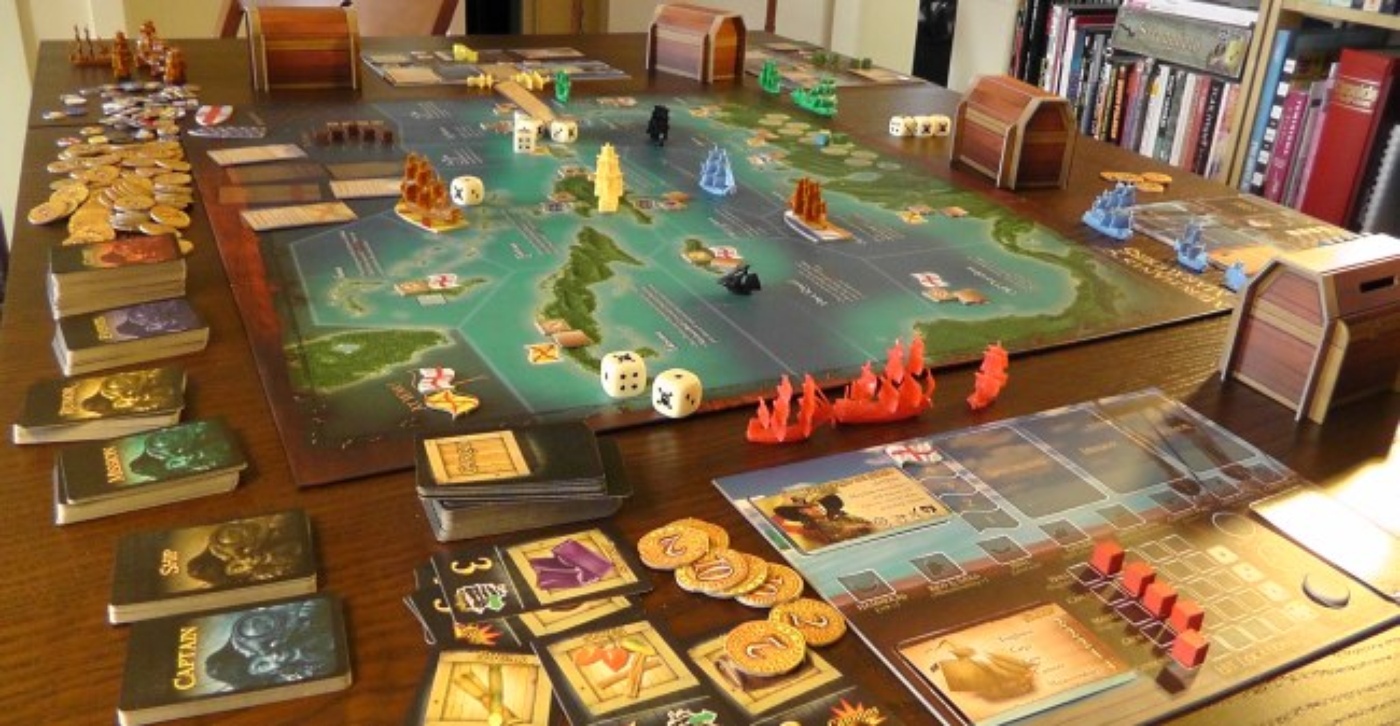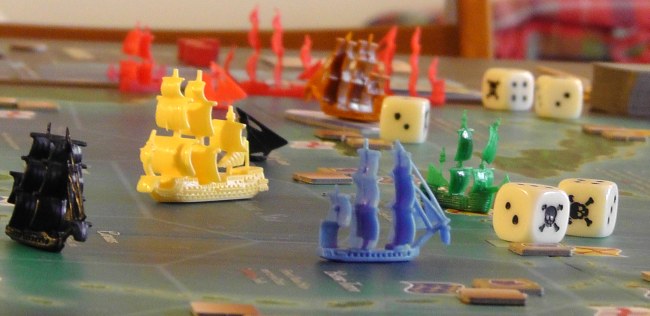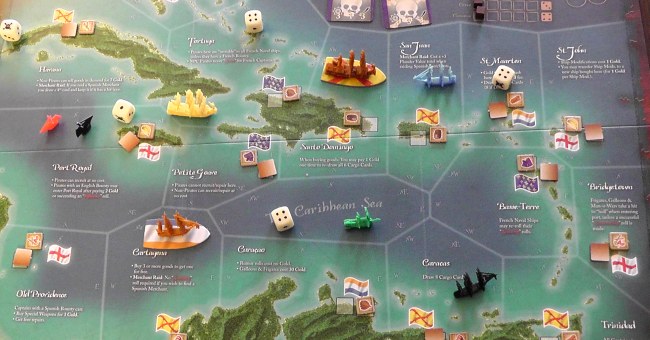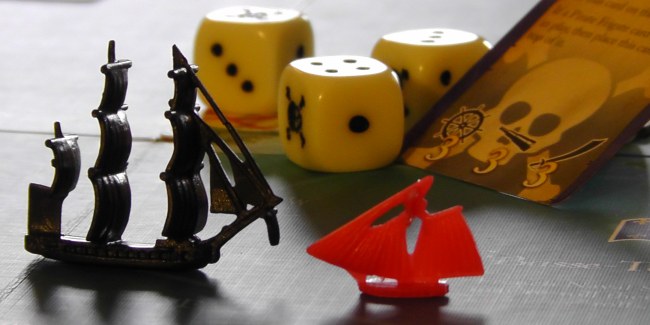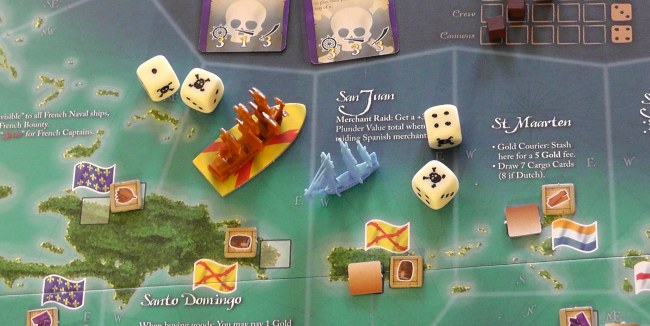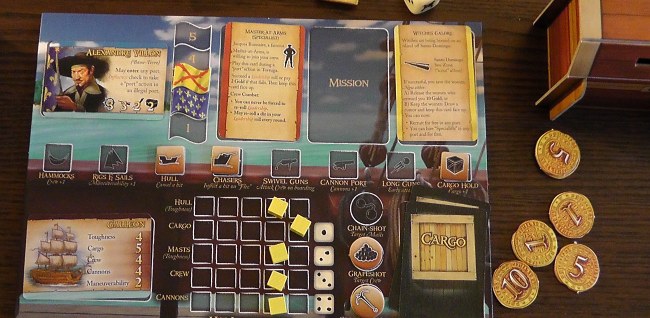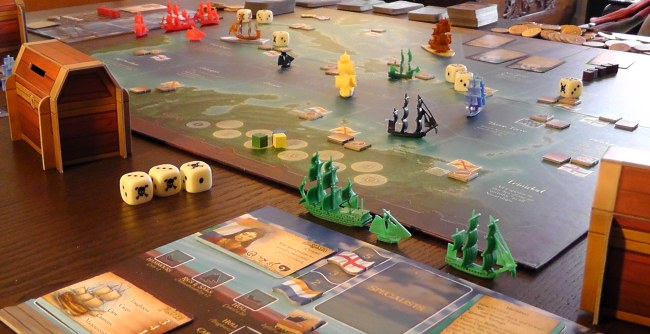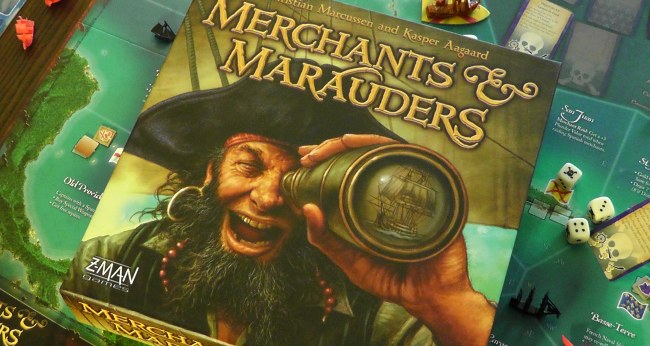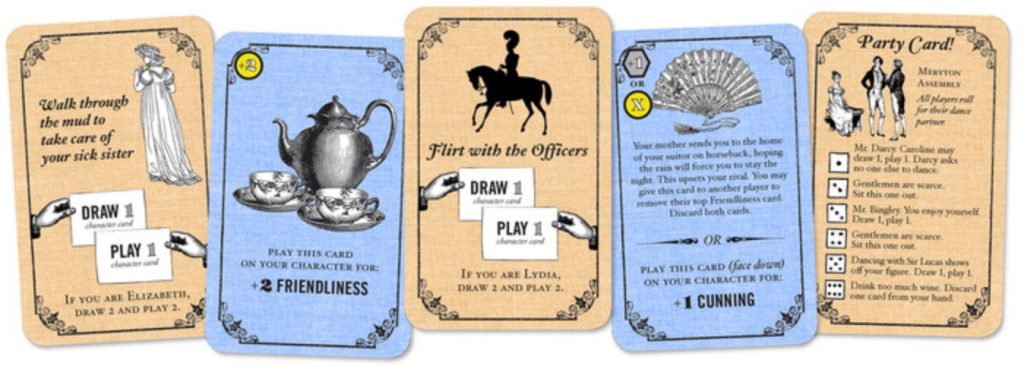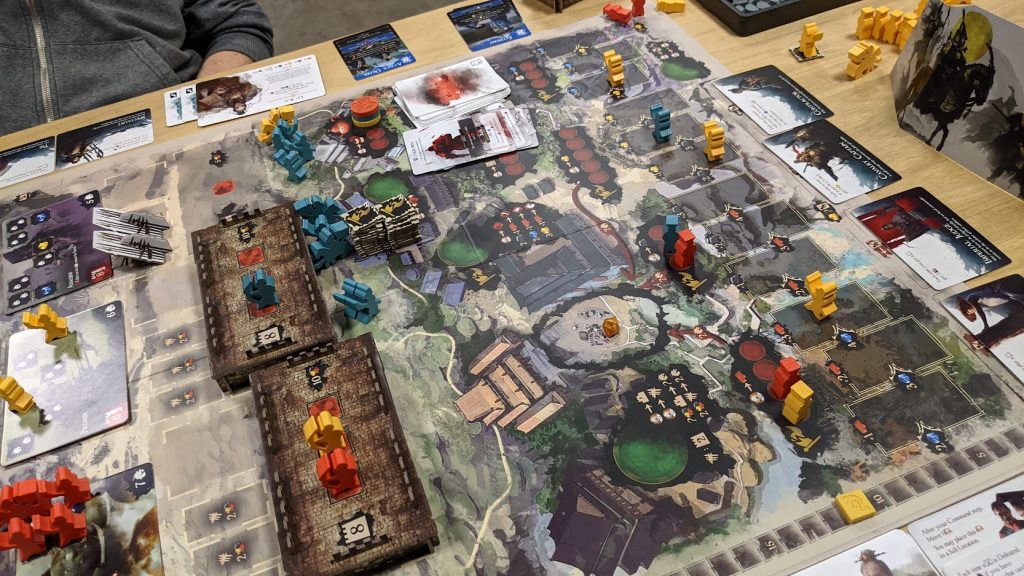Quinns: Rum! Guns! Thievery and corruption! Broadsides and boarding actions, executed by daring captains, their magnificent ships reeking of fragrant spices and tobacco. A glittering sea, taken to foul moods and murderous storms. Sharks! MONEY!
Ain’t no backdrop like the 18th century Caribbean. If only there was a board game set amongst all this.
Oh wait!
In our last episode we said we thought Fortune & Glory was a poor example of Ameritrash, Ameritrash being board games that, generally, focus on conflict, cheap thrills and on smothering your table with components rather than being a fair and nuanced game. We’re covering Merchants & Marauders, then, to show you a beautiful example of Ameritrash. This game is a parade of unexpected happenings, satisfying rewards and crushing defeats that all mix together in a foul voodoo potion which brings the Caribbean, shuddering, to life.
There’s room for two to four players here, and you all control independent ship captains. You’ll be making money, hunting out rumours, accepting and completing missions, upgrading your ships and engaging in the unfathomably risky business of sinking or capturing bigger vessels, all of which will earns you glory. The first player to chalk up ten fat glory points, wins.
The twist (and imagine a dolphin bursting from the sea to twist languidly in the air, winking at you as you catch its little dolphin eye) is that the players are given complete freedom. You can be an honest merchant, buying low and selling high. You can be a pirate, hunting down merchant vessels and steadily earning the ire of the English, French, Spanish and the Dutch. Or you can forget about these titles, and simply take opportunities as you spot them.
You can methodically bank your gold in your big cardboard treasure chest, scrimping and saving your way to victory, or you can keep it in your pocket. You could dedicate yourself to creating the toughest crew these islands have ever seen, the nimblest ship, or anything in between. You can avoid tough fights, or risk everything in them. You can even attack other players, or you can mind your own business, or choose to work together with someone else to take down whoever’s leading the pack. You can chase mysterious rumours, or you can ignore them for the rock-hard reality of trying to chase down and capture a man-o’-war, the largest ship in the game.
This stretch of islands is nothing less than a playground. A huge, waterlogged playground. Where all of the kids have knives. Did I not mention yet? Merchants and Marauders is laughably, mercilessly mean.
At the start of the game the board’s empty. Players will float around, selling bananas, buying surgeons or navigators, charming governors and generally enjoying themselves. “That’s a lot of lumber you’ve bought!” someone will say. “Maybe I should come over their and take it off you” And you’ll all laugh. And then you’ll all start eyeing each other nervously, reinforcing your hulls, buying chainshot to load into your cannons that can wreck someone else’s masts, leaving them immobile.
Then event cards will start filling the board up with other ships. Pirate sloops. Spanish frigates. English captains of mortifying competence. And you’ll realise that if you do get into a scrap with any of these miniatures, and get yourself sunk or boarded, you could lose everything.
Die, and the only thing you keep is your glory score. The next turn you’re returned to the board with a fresh-faced captain and a basic ship. Which is exactly as frightening as defeating other players is appealing.
If you hunt down another player, board their ship and kill their crew, here’s a list of what you can take from them. You don’t just burgle the poor swine. You repossess their house. You get:
- Their gold.
- Their cargo.
- Any special weapons, expensively bought at port.
- Any specialist crew onboard, painstakingly located off the back of rumours.
- Any other rumours learned at great expense from pubs across the Caribbean.
- Their entire hand of special, one-shot glory cards you get each time you get a glory point.
- …and their actual ship, along with any modifications they’ve made to it. The ultimate humiliation. If they were captaining something enviable, they’ll return to the board to find you, the victor, conducting business from it.
All of this crap you’ll have to physically lift off the table in front of the losing party to deposit it next to your own holdings, to a soundtrack of any other players sucking air through their teeth. And since you only have limited room for cargo and glory cards, you’ll probably end up chucking some of their cherished belongings overboard like unwanted sections of a newspaper.
You’ll also get a tidy stack of gold if the loser had a bounty on their head, and, as the kicker, you get a glory point for defeating another player (together with another glory card!). It’s all so brutal that while you’ll feel like grinning like an idiot, you’ll also be trying to look apologetic, since the freedom that defines the game will also leave the defeated guy free to spend the rest of the game plotting gory revenge.
Now, some of you might be sat there thinking, “That sounds horrible! I don’t know if I want this in my house.” But baby, oh sweet baby reader, you’d be wrong to think this cruelty is a bad thing, because it’s precisely what turns Merchants & Marauders from a good game into a great one. For starters, it’s made clear to players precisely how risky anything they want to do is, letting players gamble with that most exciting of board game gods, risk / reward. But there’s something bigger here.
Ordinarily, games where players run their own complex adventures can be phone-checkingly boring when it’s not your turn. You don’t care about the guy opposite you throwing handfuls of dice to see what happens to him in a fight.
Here? Because players are such appealing targets to one another, you’re nervously watching every move and every upgrade, and when someone gets into an enormous fight, it’s absolute theatre. Not only does the winner take all, while anyone can try and flee, it’s literally the hardest thing to do in the game and means you can’t shoot back, so even running away takes balls. Just not cannonballs.
And all this goes double when larger ships are duking it out, since every barrage of cannon fire is capable of inflicting wallet-crushing damage. Specifically, taking a full five hits will cost you 10 gold to repair. 10 gold which, if sequestered in your stash, would have equaled a glory point. Welcome to the suck. Please enjoy your stay!
Simply put, yes, the game is horrible. But in being horrible, it contains horror, and horror is made up of tension, tragedy, heroism and EXCITEMENT! Precisely one half of Merchants & Marauders is a pleasant, satisfying game where you build up your reputation, your crew and your ship, excitedly slotting each new specialist or upgrade into place, but this serves another purpose. It gives you something to lose.
The other half of the game is you risking everything in a way that will always delight someone, whether it’s you as you emerge unscathed time and time again, or the rest of the table, as you and everything you hold dear slips under the sea in a wash of foam and smoke. It’s almost as if the game is equal parts… Merchanting and equal parts… Marauding.
And I haven’t even mentioned my favourite part, the decks of cards covering missions, rumours, events, captains and your own hard-earned glory powers. When I first got Merchants & Marauders I was disappointed that its hundreds of tiny cards had no art and barely any flavour text. A sharp contrast with Fortune & Glory, where every single glossy card boasts a gorgeous picture.
I was wrong to be grumpy. Oh, momma board game, I was wrong, I admit it, take me back.
Most Ameritrash games worthy of the title come with stacks of cards that’ll emerge frequently and twist a rule or two, because this keeps players intrigued, lets them surprise each other and forces them to adapt, since that’s often more fun than having to plan many turns in advance.
The cards here are brilliant. There’s a generous amount of them and they’re distributed judiciously, so in any given game you’ll only see a tiny fraction of the game’s secrets. But more importantly they were clearly created by someone with both a love of the theme and a sense of humour. These cards are thick sparks that fly from the hissing cannon fuse of the game proper, drawing out the humour and even more horror.
In my last game my happy French sugar merchant quietly hunted down and raided a Spanish merchant vessel, just because I was keen to play a “Framed!” glory card and spread a rumour that it was another player. But I forgot the fine print. You play it on another captain at sea. Since everyone else happened to be guzzling rum in ports, my perfect crime backfired and I had a Spanish bounty stamped on my horrified face. This particular joke kept the table laughing for the entire game, since every time I emerged by the skin of my ballsack from a battle with a lethal naval frigate someone would ask if my career as a pirate was working out yet.
But that’s just one card, and I don’t want to spoil any more. All told, Merchants & Marauders is about as solid a game as any we’ve recommended on Shut Up & Sit Down, which is saying something. It’s elegant, funny, satisfying, surprising, and a broad-minded use of a setting that’s so often used lazily. Meaning you won’t find a single eye-patch, parrot or “Arrr!” in the box. Thank Christ.
The only warnings I’d stencil onto it is that it’s a touch complex for casual gamers, and it’d probably fit most comfortably into a group with a sense of humour. After all the preparation and maneuvering is over, someone else taking your personal ship, together with all the time, care, luck and money invested into it, will always come down to one world-ending dice roll. Merchants & Marauders is a game for players who can suffer that loss (or have that elephantine prize slip between their fingers), feel their heart rotate 360 degrees, and come back the next minute with an expression like the guy on the box.
This man? He’s the star you should sail by.

